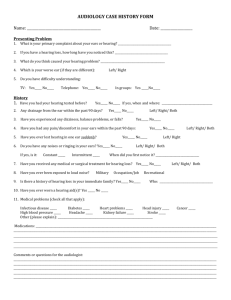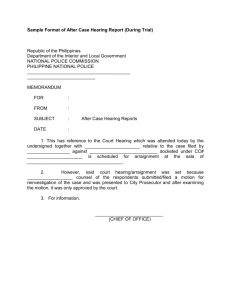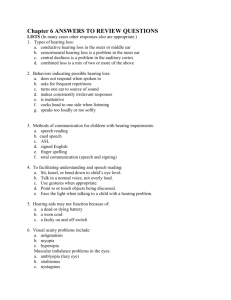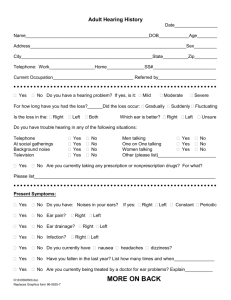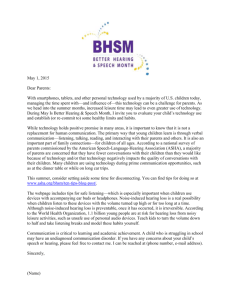Occupational Hearing Loss Among Lawncare Workers
advertisement
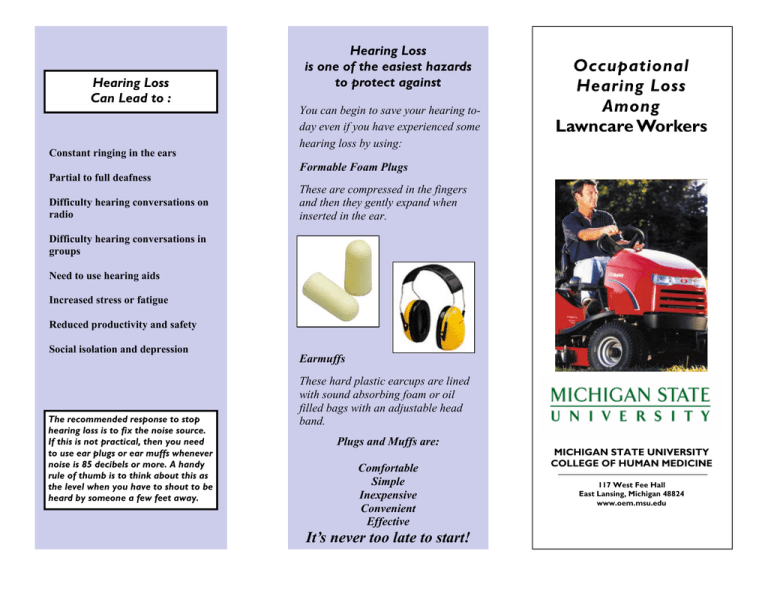
Hearing Loss Can Lead to : Constant ringing in the ears Hearing Loss is one of the easiest hazards to protect against You can begin to save your hearing today even if you have experienced some hearing loss by using: Occupational Hearing Loss Among Lawncare Workers Formable Foam Plugs Partial to full deafness Difficulty hearing conversations on radio These are compressed in the fingers and then they gently expand when inserted in the ear. Difficulty hearing conversations in groups Need to use hearing aids Increased stress or fatigue Reduced productivity and safety Social isolation and depression The recommended response to stop hearing loss is to fix the noise source. If this is not practical, then you need to use ear plugs or ear muffs whenever noise is 85 decibels or more. A handy rule of thumb is to think about this as the level when you have to shout to be heard by someone a few feet away. Earmuffs These hard plastic earcups are lined with sound absorbing foam or oil filled bags with an adjustable head band. Plugs and Muffs are: Comfortable Simple Inexpensive Convenient Effective It’s never too late to start! MICHIGAN STATE UNIVERSITY COLLEGE OF HUMAN MEDICINE 117 West Fee Hall East Lansing, Michigan 48824 www.oem.msu.edu Become Aware of the Risks: Lawncare Workers are at High Risk for Hearing Loss! The National Institute for Occupational Safety and Health (NIOSH) recommends the maximum noise level should be limited to 85 dB(A) for 8 hours of exposure. This is the same level at which the Occupational Safety and Health Administration (OSHA) requires a hearing conservation program. Hearing gets worse as you get older, but if you protect your hearing, you can delay hearing impairment until at least your 60’s. By the age of 25, lawncare workers who do not protect their hearing will have the hearing of a 60 year old who has had a quiet job or protected their hearing. Hearing Loss is Permanent and Irreversible! 120 dB(A) Hedge Trimmer dB(A) readings from a decibel meter for the following sources of damaging noise: Hearing loss can occur from a single, loud, explosive sound or from prolonged daily exposure to high levels of noise. 95 dB(A) Lawn Mower 110 dB(A) Leaf Blower After you leave work, if your ears are ringing or sounds seem dull or flat, then you were exposed to damaging levels of noise. Hearing aids will not completely reverse hearing loss and will not stop the constant ringing in the ears caused by hearing loss. 100 dB(A) Lawn Tractor 120 dB(A) Chain Saw 100 dB(A) Woodchipper


